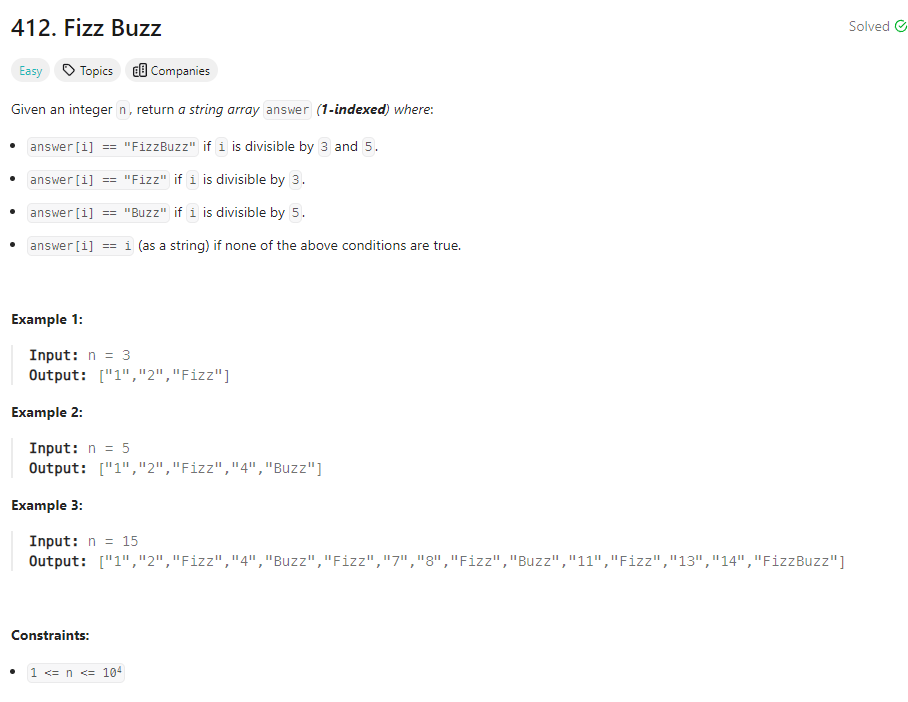Problem of The Day: Fizz Buzz
Problem Statement

Intuition
My initial thought is to iterate through the numbers from 1 to n and check their divisibility by 3 and 5 to determine whether they are multiples of both, only 3, only 5, or neither.
Approach
I approach the problem by using a loop to iterate through the numbers from 1 to n. For each number, I check if it is divisible by both 3 and 5, in which case I append “FizzBuzz” to the result list. If it is divisible by only 3, I append “Fizz,” and if it is divisible by only 5, I append “Buzz.” Otherwise, I append the string representation of the number.
Complexity
-
Time complexity: O(n), where n is the input parameter representing the upper limit of the range.
-
Space complexity: O(1) since the space required for the result list is not dependent on the input size.
Code
class Solution:
def fizzBuzz(self, n: int) -> List[str]:
res = []
for i in range(1, n + 1):
if i % 3 == 0 and i % 5 == 0:
res.append("FizzBuzz")
elif i % 3 == 0:
res.append("Fizz")
elif i % 5 == 0:
res.append("Buzz")
else:
res.append(str(i))
return res
Editorial Solution
Approach 1: Naive Approach
class Solution:
def fizzBuzz(self, n: int) -> List[str]:
# ans list
ans = []
for num in range(1,n+1):
divisible_by_3 = (num % 3 == 0)
divisible_by_5 = (num % 5 == 0)
if divisible_by_3 and divisible_by_5:
# Divides by both 3 and 5, add FizzBuzz
ans.append("FizzBuzz")
elif divisible_by_3:
# Divides by 3, add Fizz
ans.append("Fizz")
elif divisible_by_5:
# Divides by 5, add Buzz
ans.append("Buzz")
else:
# Not divisible by 3 or 5, add the number
ans.append(str(num))
return ans
Approach 2: String Concatenation
class Solution:
def fizzBuzz(self, n: int) -> List[str]:
# ans list
ans = []
for num in range(1,n+1):
divisible_by_3 = (num % 3 == 0)
divisible_by_5 = (num % 5 == 0)
num_ans_str = ""
if divisible_by_3:
# Divides by 3
num_ans_str += "Fizz"
if divisible_by_5:
# Divides by 5
num_ans_str += "Buzz"
if not num_ans_str:
# Not divisible by 3 or 5
num_ans_str = str(num)
# Append the current answer str to the ans list
ans.append(num_ans_str)
return ans
Approach 3: Hash it!
class Solution:
def fizzBuzz(self, n: int) -> List[str]:
# ans list
ans = []
# Dictionary to store all fizzbuzz mappings
fizz_buzz_dict = {3 : "Fizz", 5 : "Buzz"}
# List of divisors which we will iterate over.
divisors = [3, 5]
for num in range(1, n + 1):
num_ans_str = []
for key in divisors:
# If the num is divisible by key,
# then add the corresponding string mapping to current num_ans_str
if num % key == 0:
num_ans_str.append(fizz_buzz_dict[key])
if not num_ans_str:
num_ans_str.append(str(num))
# Append the current answer str to the ans list
ans.append(''.join(num_ans_str))
return ans